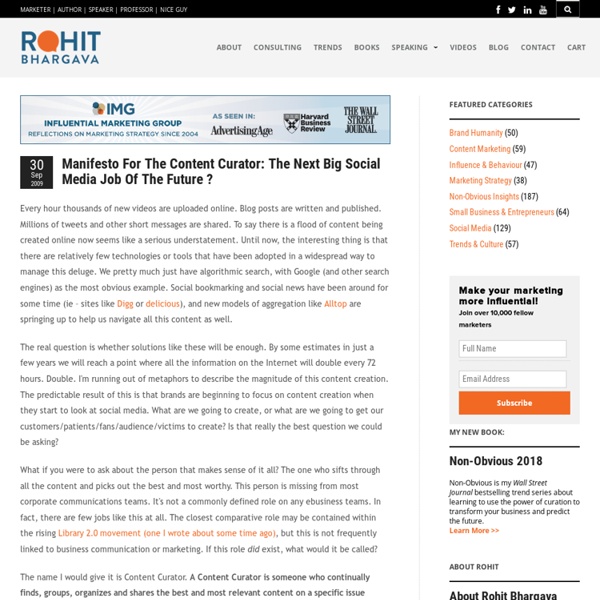Manifesto For The Content Curator: The Next Big Social Media Job Of The Future ?
Every hour thousands of new videos are uploaded online. Blog posts are written and published. Millions of tweets and other short messages are shared. The real question is whether solutions like these will be enough. What if you were to ask about the person that makes sense of it all? The name I would give it is Content Curator. In an attempt to offer more of a vision for someone who might fill this role, here is my crack at a short manifesto for someone who might take on this job: In the near future, experts predict that content on the web will double every 72 hours. After writing this, I can't help but wonder if there might already be people out there with this title. Interested in hearing more about content curation? Additional Posts About Content Curation:
Facebook’s Secret Sauce: Curation Pays Off
Organiza tus favoritos con Symbaloo
Symbaloo es una herramienta muy práctica para organizar y clasificar nuestras páginas web preferidas. Con esta aplicación podemos crear un escritorio virtual muy completo y funcional, con diferentes secciones según la temática de los enlaces que queremos tener disponibles. Crear un escritorio virtual es una labor que a todos los docentes nos interesa porque nos facilita mucho el acceso a la información y, en el caso de Symbaloo, también se lo facilita a nuestros alumnos ya que su interfaz en clara e intuitiva. Podemos compartir nuestro escritorio o hacerlo privado según nuestros intereses y también podemos utilizar la versión "EDU" de la herramienta utilizada cada día por más docentes como PLE. Cómo utilizarla Nos registramos en Symbaloo con los datos que habitualmente se solicitan. Una vez terminado el trabajo en Symbaloo podemos compartir individualmente el escritorio y cada webmix desde la sección "Enviar a mis amistades". Utilidades didácticas Ejemplos Para saber más Valoración media
Ten Use Cases for Content Curation in Marketing « Marketing to Business Executives Blog
Content curation offers the promise of addressing both information consumers’ and marketers’ challenges in taming the flood of digital information. But as I look at the vendor landscape it is apples and oranges. Vendors are solving several different problems. Demonstrate thought leadership. Nurture leads. Cultivate a community. Keep current on critical issues. Gather competitor intelligence. Monitor brand activity. Support mission. Reduce costs. Manage social media participation. Capture and repurpose social media mentions. Build advertising or sponsorship revenue. Different use cases drive many of the variations in functionality of content curation platforms. Like this: Like Loading...
Big in 2011: Curation and Consultation - The Connected Web
Over the past two months, I've bookmarked less than a half dozen articles as worth noting for the insights they provide. Looking back over them this past week, I've noticed two dominant themes that are core to the nature of collaboration and the social web. These two themes, curation and consultation, will both be key trends to watch in 2011. Here, moving backwards through time, are links to the five articles and the reasons why I rated them as keepers. Writing at the beginning of this month, Paul Ford puts his finger on a core truth about the Web in an essay entitled The Web is a Customer Service Medium: "Why wasn't I consulted? Ford argues that every medium has one characteristic role that uniquely identifies it, and that the Web's unique purpose is to give people a platform where they can register their opinion. A single sentence stood out for me in Erick Schonfeld's TechCrunch prediction article, Seven Technologies That Will Rock 2011: Those are my picks.
Related:
Related:



